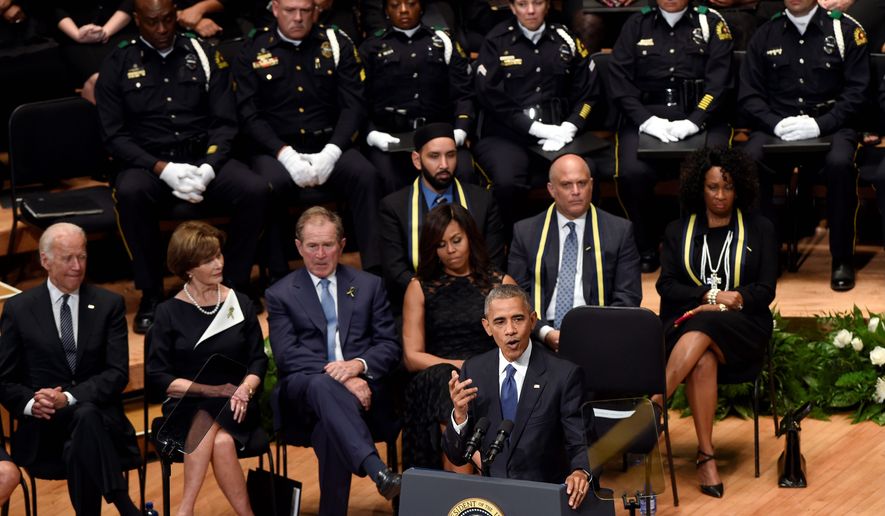Law enforcement leaders said President Obama’s speech Tuesday at a memorial service for five slain Dallas Police officers made clear he had taken to heart concerns they aired a day earlier in a meeting meant to address divisions between police and communities of color.
Since protests against police brutality turned into riots in Ferguson, Missouri, in the summer of 2014, rank-and-file officers increasingly have felt at odds with the Obama administration as the president has expressed support for protesters involved in Black Lives Matter movement.
A candid meeting between Mr. Obama and leaders of eight law enforcement groups on Monday followed by his speech in which he praised officers and called for national unity were seen as watershed moments for several in law enforcement.
“This is a speech that I’ve been waiting for,” said James Pasco, executive director of the National Fraternal Order of Police, one of the eight leaders at Monday’s meeting. “Hopefully we will go forward. The president has reached out to us, to the major police organizations. We can’t do it without him and he sure as heck can’t do it without us.”
Striving to defuse tensions between law enforcement, troubled communities and activists, Mr. Obama acknowledged Tuesday the contributions each group has made while also asking each to take responsibility for their actions, even if they might be carried out only a select few bad apples.
In his praise of officers, the president pointed out that police often are tasked with serving as fill-in social workers, parents and teachers — not just peace keepers.
SEE ALSO: Obama: ‘Easier for a teenager to get his hands on a Glock than a computer or even a book’
“We ask police to do too much and we ask too little of ourselves,” he said in Dallas. “We tell them to keep those neighborhoods in check at all costs, and do so without causing any political blowback or inconvenience. Don’t make a mistake that might disturb our own peace of mind. And then we feign surprise when periodically when the tensions boil over.”
Jonathan Thompson, executive director of the National Sheriff’s Association, said he expects skeptical members will take a “wait and see” approach to gauge whether the president’s actions back up his words. But he believes Mr. Obama’s broader message will resonate with law enforcement members who have felt unfairly demonized each time a new use-of-force or misconduct case surfaces.
“On very large level he tried to send a message to the nation that these people are doing very dangerous work and we need to recognize that — recognize and honor their authority,” said Mr. Thompson, who also attended the Monday meeting in the Roosevelt Room. “That’s key.”
Much of the tension between the administration and police groups has stemmed from what police see as a rush to judgment and general lack of support when officers are involved in deadly use-of-force incidents.
“A lot of cops, and a lot of my cops, don’t think he’s supportive of law enforcement,” said Thomas Manger, president of the Major Cities Chiefs Police Association and chief of the Montgomery County Police Department. “They think that if they mess up, the Department of Justice will do everything they can to put them in jail.”
Pointing squarely to the investigation of Ferguson Police Officer Darren Wilson, who was cleared of all civil rights violations in the fatal shooting of teenager Michael Brown, Chief Manger said that many police felt that Mr. Obama and then-Attorney General Eric Holder were unfairly critical of the officer’s actions before learning all the facts of the case.
SEE ALSO: Obama defends Black Lives Matter protests at police memorial in Dallas
“Right now what cops want from the president is that he not jump to concussions. When we have incidents like we do in Louisiana and Minnesota, that he wait for the facts to come out before he be critical of the officers’ actions,” said Chief Manger, referencing last week’s fatal police shootings of two black men.
In Monday’s private meeting, police leaders said they received assurance from the president that his administration would review a prior decision that halted the sale of some surplus military equipment to law enforcement agencies. Some surplus item sales were banned altogether while others now require more paperwork to obtain.
Bill Johnson, executive director of the National Association of Police Organizations, who attended Monday’s meeting, said a commitment to review the classification of each item on the prohibited equipment list represented a first concrete step toward rebuilding trust.
A White House meeting scheduled for Wednesday may serve as the next such test of the president’s commitment to law enforcement. Police officials plan to gather with activists, civil rights leaders and political leaders to devise plans to repair trust between law enforcement and the communities they serve.
Mr. Johnson said law enforcement are committed to working with the administration, but he said lawmakers have to do their part and condemn violent rhetoric and anti-cop sentiments before they boil over into violence targeted toward officers.
“We will certainly do our best to try to improve things but we definitely need to see a sustained and strong defense of law enforcement prior to these events happening,” he said.
• Andrea Noble can be reached at anoble@washingtontimes.com.




Please read our comment policy before commenting.